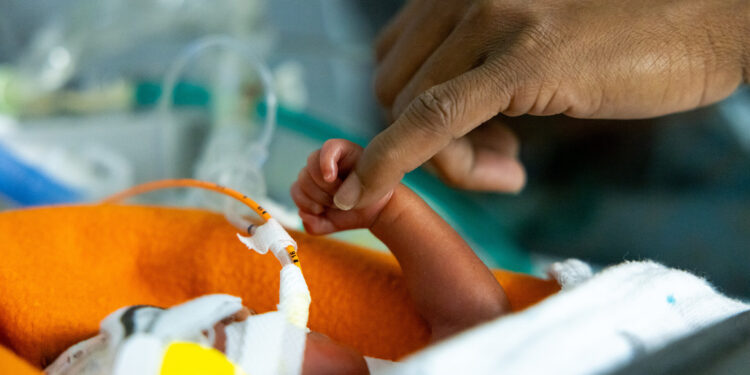A new study led by the University of Iowa determined that extremely premature infants fed donor milk fare just as well in terms of neurodevelopment as those fed formula. Researchers also found that mortality rates from life-threatening illness were cut in half in infants fed donated milk. Credit: Liz Martin, University of Iowa
Extremely premature infants fed breast milk had a rate of life-threatening illness less than half that of those fed formula, according to a new study led by the University of Iowa.
Researchers also found that extremely premature infants – classified as babies born before 29 weeks – fed donor milk had the same neurological development as those fed formula.
Extremely premature infants are at high risk of neurodevelopmental disorders (including difficulties with language and speech, motor skills, behavior, memory, learning, and other functions) and necrotizing enterocolitis, a condition in which the lining of the intestines becomes inflamed and dies, which can be fatal for the baby.
While it is widely accepted that extremely premature infants fare better when fed their own mother’s breast milk, less is known about the outcomes associated with those fed breast milk or formula. This is important because some mothers may not be able to provide breast milk or may not be able to provide it in the amount the child needs.
In either case, neonatologists may turn to feeding these babies milk or formula. The study aimed to determine if one option was better for their development.
“What we showed in this study is that there was no developmental disadvantage to using donor milk, which in itself is an important finding,” says Tarah Colaizy , professor of pediatrics-neonatology in the Stead Family Department of Pediatrics at UI Carver. College of Medicine and corresponding author of the study.
“We also verified that if you don’t have a choice between breast milk, using donor milk versus preterm formula is associated with a decreased incidence of necrotizing enterocolitis.”
The findings are also important for potentially updating recommendations for donor milk, which was used sporadically in hospitals until about 15 years ago and for which questions remain about its value.
In 2012, the American Academy of Pediatrics issued a policy statement endorsing the use of pasteurized donor milk fortified with essential nutrients. However, the recommendation was not universally accepted as there was little evidence to support this view.
Since then, smaller studies of premature infants have shown no harm associated with using donor milk.
Colaizy’s double-blind randomized clinical trial aimed to provide the deciding factor. She and her team spent seven years recruiting 483 extremely premature infants weighing less than 1 kilogram (about 2.2 pounds) at birth from 15 Neonatal Research Network centers in the United States, by far the largest population and the most extensive to study. These infants received either donor milk or formula in bottles with covered labels.
The researchers allowed each hospital’s neonatal intensive care unit (NICU) to determine the feeding schedule, frequency and dosage, among other factors.
“Everyone did it differently in terms of nutritional management. And this is the real world. We replicated real world conditions,” Colaizy says.
When infants reached the equivalent of 22 to 26 months of development (corrected for prematurity), they were tested with the Bayley Scales of Infant Development, a test used to identify children at risk for developmental delay.
The average cognitive score for the donor milk group was 80.7, compared to 81.1 for the formula group, an insignificant difference. The average score of full-term babies tested between 22 and 26 months of age is 100. Likewise, language and motor scores did not differ significantly between groups.
However, necrotizing enterocolitis developed in 10 infants (4.2%) in the donor milk group compared with 22 infants (9%) in the formula group.
“This research validates existing recommendations from the American Academy of Pediatrics regarding the use of donor milk in this very low birth weight infant population, as we now have additional evidence from a landmark study,” explains Colaizy, who has studied the use of donor milk in NICUs since 2006.
One of the study centers was the UI Stead Family Children’s Hospital, where neonatologists use donor milk from the Mother’s Milk Bank of Iowa, founded in 2003 and which was one of the first donor centers to milk in the United States.
“We were pioneers in using donor milk in NICUs and creating this nonprofit milk bank,” Colaizy says. “We are always looking for donors.”
The study titled “Neurodevelopmental Outcomes of Extremely Preterm Infants Fed Donor Milk or Premature Infant Formula” is published in JAMA.
More information:
Tarah T. Colaizy et al, Neurodevelopmental outcomes of extremely preterm infants fed donor milk or preterm infant formula, JAMA (2024). DOI: 10.1001/jama.2023.27693
Provided by University of Iowa
Quote: Study shows value of breast milk donation for extremely premature infants (February 20, 2024) retrieved February 20, 2024 from
This document is subject to copyright. Apart from fair use for private study or research purposes, no part may be reproduced without written permission. The content is provided for information only.



